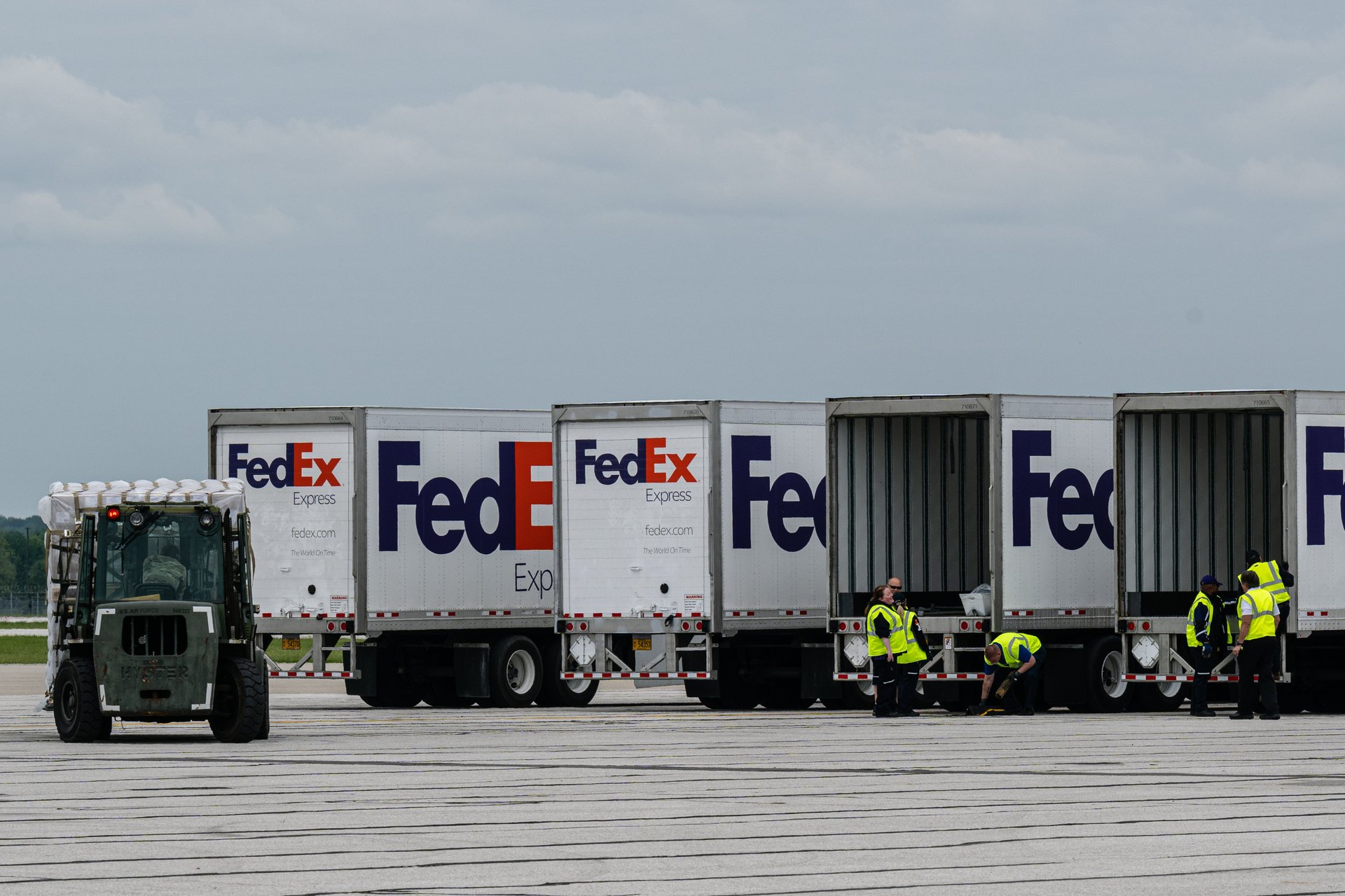🌎 FedEx didn’t deliver
Plus: How will the Queen's funeral affect the UK economy?

Good morning, Quartz readers!
Here’s what you need to know
FedEx’s earnings were a big disappointment. The stock fell 16% in after-hours trading as the logistics behemoth withdrew its full-year financial guidance and announced a series of cost-saving measures.
Adobe is spending $20 billion to buy its biggest rival. The part-cash, part-stock deal for design platform Figma would represent the largest-ever purchase of a private software company—if it survives regulatory scrutiny.
The Biden administration increased its offshore wind power target. An additional 15 gigawatts of new floating offshore wind power capacity should be added by 2035.
China’s Shein will expand into the US. The fast-fashion giant, valued at $100 billion, plans to build three distribution centers to speed up delivery times.
Uber is investigating a cyber breach. An 18-year-old told the New York Times he accessed the company’s internal systems and left a Slack message demanding higher pay for drivers.
Mexico’s luxury department store Liverpool bought a stake in Nordstrom. The high-end retailer paid $293.8 million for a 9.9% passive stake in the Seattle-based company.
What to watch for
The UK will grind to a halt on Monday (Sept. 19) for the funeral of Queen Elizabeth II. While the declared bank holiday has no mandate for closures, thousands of retailers, shops, and businesses across the country will shutter, in addition to many schools, several hospitals, and even food banks.
Meanwhile, hundreds of heads of state and foreign dignitaries will fly into London (though not in helicopters or private jets) to attend a ceremony likely to cost British taxpayers millions of pounds. With Princess Diana’s funeral having totaled about £3-5 million, and the Queen Mother’s around £5 million, Monday’s event will no doubt be an even pricier affair.
Not everyone approves of the national shutdown, nor the use of public funds to foot the bill of the Queen’s last rites, especially as the UK faces a cost-of-living crisis and soaring inflation. The decline in economic output from the holiday may well be in the billions, only adding to the royal family’s annual price tag.
Will China break into the luxury market?
China has figured out fast fashion, phones, and drones, but luxury is an elusive sector that it has yet to crack. The idea that China can one day shift from being the world’s top consumer of high-priced goods to a major creator of them is a story that investors have been hearing for years.
Lanvin Group, which plans to list on the New York Stock Exchange, wants to finally make that story come true. In its SPAC announcement, it laid out an ambitious vision of one day rivaling luxury houses like LVMH and Kering while tapping into Asia’s deep-pocketed consumer market.
But big questions still remain. The IPO date is still hazy, and Fosun, its debt-saddled parent company, has recently come under the scrutiny of Chinese regulators. Internal shakeups and covid curbs have also proven to be stumbling blocks. The group has potential, but realizing its vision may be a far way off.
The countries controlling Africa’s wealth
More than half of Africa’s total wealth is controlled by only three nations, according to an annual report on Africa’s wealth (pdf).
The latest tallies of private wealth (not to be confused with GDP):
🇿🇦 South Africa: $651 billion
🇪🇬 Egypt: $307 billion
🇳🇬 Nigeria: $228 billion
🌍 Africa in total: $2.1 trillion
As a testament to how much the top wealthiest countries affect the continent’s total wealth, in the past decade, South Africa, Egypt, and Nigeria have had a negative private wealth growth rate of -12%, -23%, and -27% respectively, leading to a 7% decline in Africa’s wealth growth since 2011. Faustine Ngila crunches some numbers.
✦ Love stories like these? Keep us doing what we do by supporting our journalism. Become a member today for 40% off.
Surprising discoveries
Dutch students created a car that captures carbon dioxide as it drives. It’s fitted with a filter that can absorb up to 2 kilograms of CO2 over 20,000 miles (32,000 km) of driving.
A robot called Erica is learning to have a sense of humor. Scientists are training an algorithm to understand whether laughter is appropriate, and what kind of laughter is best suited to a certain conversation.
You say tomato, I say genetically-modified purple tomato. The US approved a British lab-altered berry for cultivation, which could reach supermarkets as early as next year.
A fireball spotted across the sky above the British isles was, in fact, a meteor. And not Elon Musk-related space junk, as was previously assumed.
Speaking of asteroids: It may not have been a meteor that caused dinosaurs’ demise. A new study revives the hypothesis of a volcanic eruption.
Our best wishes for a productive day. Send any news, comments, lands before time, and snickering robots to [email protected]. Reader support makes Quartz available to all—become a member. Today’s Daily Brief was brought to you by Sofia Lotto Persio, Samanth Subramanian, Tiffany Ap, Julia Malleck, and Susan Howson.